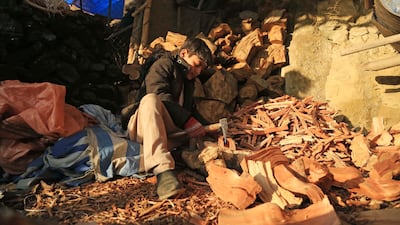The word of the week in the Swiss mountain resort of Davos recently was "polycrisis" — a reference to the current state of the world and the simultaneous occurrence of many catastrophic events, including the war in Ukraine, the energy crisis and extreme weather.
During the World Economic Forum Annual Meeting, it also became clear that artificial intelligence would be the subject of the year.
The increasing interest in the ChatGPT technology, created by OpenAI and backed by Microsoft, heralds the introduction to the mainstream of natural language artificial intelligence technology. Our lives will likely never be the same.
What we do not yet know, however, is what kind of global economic picture will emerge in the next few months.
We were told the situation is “less bad than we feared”, according to Kristalina Georgieva, the International Monetary Fund's managing director, who often provides a lovely turn of phrase as well as a colourful anecdote to make her points hit home.
Ms Georgieva indicated that with the inflation trend potentially reversing, China opening its economy following Covid-related restrictions and the strength of labour markets keeping up spending by consumers, there were reasons to be optimistic.
While there were three downgrades to the global economic outlook in the past year, she confirmed that at the next forecast, due next week, the IMF would very likely not downgrade again, something that was “already good news”.
We will soon know if the IMF upgrades its forecast for 2023 but even if it does it won’t be a huge change, she said.
The caveat, however, was that global growth of about 2.7 per cent projected for the year was “not fabulous”, it being equivalent to the third-lowest growth rate in the past decade. She urged caution and said there was a good reason to still be wary — the return of China could trigger higher oil and gas prices, reigniting another round of inflation.
While employment remained robust, higher interest rates — increased by central banks last year to tame inflation — have yet to bite and if they impact more severely, Ms Georgieva said she expects job losses to go up. A cost of living crisis and unemployment would change the paradigm, she added.
She expected that governments could once again step in to help people directly should that happen, setting up a potential clash between fiscal policy and monetary policy.
It would mean central bankers once again raising interest rates, which would dampen growth.
The horrible war in Ukraine, with its tragic human cost, also represented tremendous risk for confidence, especially in Europe.

Ms Georgieva also urged countries not to dismantle trade systems in their efforts to diversify supply chains, whether this was to meet climate change goals or to build resilience after Covid disruptions. She said if such changes were made rationally then the adjustment cost would be negligible but should nations act like an “elephant in a china shop and trash trade”, the cost can go up to a 7 per cent loss of gross domestic product — or $7 trillion.
“Be pragmatic, collaborate, do the right thing, keep the global economy integrated for benefit of all of us,” she said.
She also made the point about developing economies and climate change. They should not be forgotten or “we are all cooked”.
Ms Georgieva told a story about two men coming across a bear in the forest. When one of the men pulls a pair of trainers out of his backpack, the other scoffs: “Do you really expect to outrun a bear?” "No," the man with the trainers replies, "I only need to outrun you".
She told the story to warn against the climate crisis spurring aggressive competition between economies, particularly concerning subsidies and protectionism in industries such as clean energy, electric cars and technology. “We all need trainers,” she said.
Bank of Japan governor Haruhiko Kuruda made the point that with the Asian economic outlook being uneven across several countries, Pakistan, Sri Lanka and Bangladesh were the most affected by climate and will need help this year.
Christine Lagarde, the head of the European Central Bank, echoed this sentiment during the same discussion.
She said there was so much to do on climate, biodiversity and poverty, that there was plenty for all. A “subsidy race” should be avoided, she added.
However, French Economy Minister Bruno Le Maire warned that there needed to be “fair competition”, singling out China in an echo of past clarion calls that Ms Georgieva and Ms Lagarde were warning against.
The US Inflation Reduction Act has Europe a little on edge, given its hundreds of billions of dollars aimed at climate-related industries. Mr Le Maire said there was a need for a global approach and it was a good thing to invest in these sectors. However, he also urged Europe to do the same thing.
"To compete we need a strong, effective, efficient European industrial policy. Acceleration on subsidies … simplification of processes … focus on specific sectors … decarbonisation of the economy [is the] biggest opportunity and challenge," he said.
He also complained about “foreign products”, suggesting there was a so-called Europe-first mentality. He also highlighted how easy it might be this year for a costly trade war to break out.
Ultimately we are in a black box and we won’t know what the global picture is until we come out of it in a few weeks' time. By then words will have become actions.


